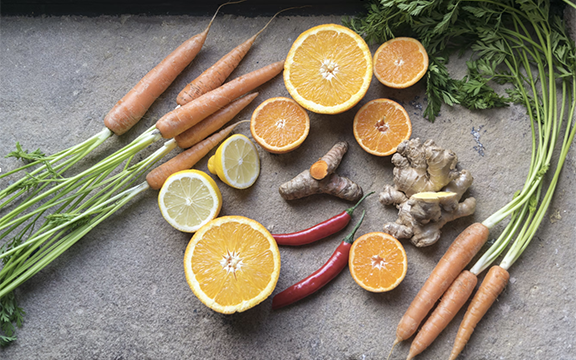 Most of our flexibility comes from Yoga, walking, static stretching, and other forms of exercise. Still, diet also plays an important role. Eating the right foods can help us improve on more advanced poses and become a more well-rounded Hatha Yogi.
Most of our flexibility comes from Yoga, walking, static stretching, and other forms of exercise. Still, diet also plays an important role. Eating the right foods can help us improve on more advanced poses and become a more well-rounded Hatha Yogi.
1. Collagen
Collagen is the body’s most common protein, strengthening our bones, muscles, tendons, and ligaments. Body parts like arteries and digestive organs even have specific types of collagen, with unique functions. It should be an integral part of everyone’s diet, no matter their fitness level or which types of exercise they prefer.
These foods contain high doses of collagen:
- Nuts and nut butters
- Berries
- Broccoli
- Hummus
Collagen consumption also becomes more crucial as we age. Human bodies slowly produce collagen at lower rates once they reach about 60 years old. Among the resulting symptoms are stiffness, loss of mobility, and more frequent muscle aches — not ideal for yogis. A collagen-rich diet will help us stay flexible and practice Yoga.
2. Silicon
Silicon is a unique metalloid compound that plays a crucial role in collagen production and contributes to connective tissue health. It’s a common supplement for people with osteoporosis and other ailments that cause bone or skin brittleness. Our flexibility can significantly benefit from a sizeable daily supply of collagen and silicon.
Thankfully, silicon is present in many common foods:
- Oats
- Rice
- Wheat
- Cereal
- Green beans
- Root vegetables
3. Antioxidants
As the name suggests, antioxidants fight against oxidation in our cells. Lower oxidative stress has many impressive benefits, including slowing the aging process and preventing cognitive illnesses. Healthier cells lead to better athletic performance across the board, from strength to flexibility.
Antioxidants can be found in a wide variety of delicious foods:
- Pecans
- Apples
- Blueberries
- Carrots
- Potatoes
- Beans
- Avocados
- Leafy greens
Antioxidants are abundant, so incorporating some of these foods into one’s daily diet should be easy and will keep us from missing out on their benefits!
4. Vitamin C
Vitamin C is another mineral that assists in collagen production. It’s also one of the most powerful antioxidants we can consume, playing an integral role in developing and recovering all body tissue. It’s an absolute must-have for everyone regardless of their lifestyle, but it’s especially important for yogis because of how much we stretch our bodies.
You can find high amounts of Vitamin C in these foods:
- Oranges
- Strawberries
- Pineapple
- Cucumber
- Kiwi
- Broccoli
- Brussels sprouts
Oranges and other citrus fruits are particularly acidic, which can negatively affect digestion, so be careful not to eat too many acidic foods in one day. We can get our Vitamin C from a wide range of sources.
5. Glycine
Glycine is an essential amino acid that improves collagen production, acts as a neurotransmitter, and helps with the digestion of other supplements, such as creatine. Our bodies naturally produce it, but not in high enough doses to substantially impact our flexibility. We can increase our glycine intake with these foods:
- Peanuts
- Granola
- Seeds
- Legumes
- Cauliflower
6. Omega-3s
Omega-3 fatty acids are one of nature’s most versatile nutrients. They promote skin and bone health, assist in preventing certain cancers, and improve cardiovascular function by reducing blood vessel inflammation and platelet aggregation. Stronger blood flow leads to better muscle performance and recovery, which in turn improves your flexibility.
These vegan foods contain high amounts of Omega-3s:
- Seeds
- Walnuts
- Leafy greens
Omega-3 supplements are also popular because of their limited supply in regular foods. Since vegans and vegetarians are not eating tuna or salmon every day, getting a supplement is important.
Diet Is Just As Important As Exercise
Yoga is a solid foundation of an active lifestyle, but practicing different poses isn’t enough to improve our health and well-being. Diet is just as important as exercise, if not more. That’s why as yogis, we need to be sure to get a sizable daily intake of these six nutrients to improve our flexibility and overall performance.
About the Author:
 Mia Barnes is a freelance health and wellness writer with a passion for Yoga, mindfulness and nutrition. She is also the Founder and Editor-in-Chief of Body+Mind Magazine, an online healthy living publication.
Mia Barnes is a freelance health and wellness writer with a passion for Yoga, mindfulness and nutrition. She is also the Founder and Editor-in-Chief of Body+Mind Magazine, an online healthy living publication.

